










I was born on August 21, 1931 in the southwest front bedroom of Grandpa Frysinger's house at R.D. 1, Harrisburg, PA. Since I was early, I arrived before Dr. Horn could come to help in the birth. Even before that, however, I had caused problems in that my mother Irene lost her first job as a school librarian since they considered it unprofessional to be pregnant during the school term. Father brought some gladiolus to mom during my first days so mom always told me that they were her most favorite flowers.
My first residence in Colonial Park didn't make any impression on me, but after one year my parents moved to a second floor apartment in Pennbrook where I started my adventures. According to my father I knew more names of butterflies than any kid on the block and helped dad feed flies to our pet knute. My biggest adventure was my unauthorized visit downtown (three houses away). While looking at the traffic and the streetcar in front of the barbershop, I was spotted by the barber who took me in and returned me to my parents.
According to Mother, my life almost ended at a very early age. On one of those Sunday trips to the Royer's in Lititz, I went strolling alone in the back yard and decided to take a swim in the goldfish pond. Mom rescued me and made me well again, since I was found face down in the water. From that day on the pond had a fence around it high enough to keep little guys out, a great inconvenience in later years when I sailed my small boat in it.

before my swim

after my swim
In 1934 we moved to the farm next to Grandpa Frysinger and starting fixing up the barn to raise chickens. I helped as I could while learning carpentry. Creating the second floor in the barn was the real fun. Going up the half finished stairs was the challenge.
After that the drudgery of agricultural employment took over. Dad had this idea that pulling weeds in the garden could surely be mastered. Over the next few years red beets became my specialty. Washing them clean to sell in Steelton was my job. Grading and bunching was left to Dad.
The biggest impression during my early years was the cellar door, which dropped on my head creating a wound which took some time to heal, and which some say, affected the way I thought about things for the rest of my life.


the cellar door me with head bandage
When I was old enough to make change I not only got a chance to collect the eggs, but also to go along on the Saturday truck route in Steelton to sell the eggs and the produce.
My early school days were not too exciting. Since dad taught in the same building, I was the first kid to arrive on the first day of school, all decked out in my best knickers. No long pants until third grade. Had a tooth broke in second grade from being punched and a major wood paddle spanking in third grade for causing harm to another kid. Forth grade teacher was very old-fashioned in learning styles and was endlessly complaining to father about me since he was still teaching upstairs in the biology laboratory in the same building. This caused quite a bit of misunderstanding at home.
By late grade school the daily activity was set. First thing in the morning was to put on my bib overalls and go wake up the chicken, give them some food and clean the water pans. After breakfast (Kellogg's something or the other), I waited in front of the house for the school bus. After, school and the bus ride home was the evening chores of feeding the chickens. Sister Anne helped with gathering the eggs. Mom had to do it at noon when we were in school.
In sixth grade I had the honor of having the same teacher, Nevin Moyer, who had taught my grandmother when he first started. He was OK, but he was often sick so his wife, not OK, taught most of the time.
My favorite summer vacation was going to Lititz to live with Grandma Royer for a week. It was my introduction to "city" life. There were playmates. At home only a sister. We played cops and robbers, cowboys and Indians, and in those days Yanks vs. Japs and Germans. Fourth of July in the Lititz Springs Park was a high event, only topped by Rosie's daily round to sell ice cream cones from the back of the truck on the long warm evenings on Lincoln Avenue. The frightening thing at Grandma Royer's house was the two big pictures in the upper front bedroom where I often was put to sleep. Later I learned to love them as grandma and grandpa's wedding pictures, but as a small child they were very scary. The house had other compensations in that it had several "secret passages" and many hideaways.
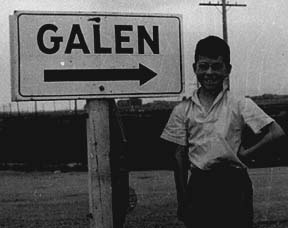
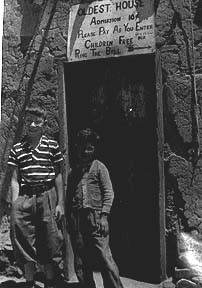
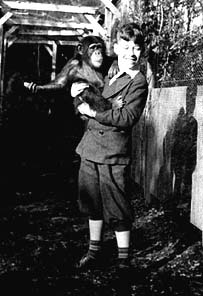
Travel photos at age 10 in Western US and Florida

After becoming 12 I rode my bike 5 miles to Colonial Park and became a Boy Scout. I took my scout advancement very seriously and passed all tests up to the swimming test. Since I never had the chance to go swimming, once a summer for a picnic by the creek being the only time I got wet except for the tub and the sprinkler, the swimming test was a roadblock. Finally with some lessons, at the island in the middle of the Susquehanna at Harrisburg, my scoutmaster "passed" me. Since I didn't really know how to swim, the big nightmare of summer Boy Scout camp was the initial swimmer test where I looked very ungraceful and ended up confined to the non-swimmer crib. Even though I had 23 merit badges and advanced through Life Scout, the full Eagle skills of swimming and life saving I did not master until in graduate school.
Link to My Scouting Life page
At home my winter hobby was my stamp collecting, and tinkering with my radio. Late in WWII some parts became available to make simple diode receivers and I had my first home built radio. In junior high I took up photography, first with dad's camera and then a press camera I was able to buy. Mom gave me the dry sink to use as a darkroom bench and I closed off a part of the dirt section of the basement to make a darkroom. Here I developed and printed many photos, some of school groups to make some money. The main source of income, however, was from the chickens and the produce which I helped prepare for the Saturday selling.
I learned to drive in the 1936 farm truck. My first "authorized" trip was, at 14, when dad said "go get", so I drove across the field from Grandpa's to our house and return. My on road driving started in the 1939 Studebaker coupe, which had belonged to Grandma Royer, but which she no longer drove. It had overdrive, a fifth gear which it would enter automatically when you let your foot off the gas going over 42 miles per hour.
To counter what is now known as the wimp factor, I decided to play high school football. In ninth grade, I was a tackle on the Jr.-Varsity team and had a lot of fun playing the games. In those days we played on both offense and defense, so you got to play the whole game. Tenth grade was also fun. In the last two years, I was backup for the Varsity team, got to start in several games because the coach, Bo Capello, thought I was smart, so therefore, I should be a good player. Since I played without my glasses my planning range was about 6 feet. I was real fast as a pulling guard, and did good pass blocking. On defense, I played what is now called nose tackle. My major activity, however, was watching the game from the bench (good 50 yard line seats). Mother got concerned because all I did when I was at home was sleep and eat. But you must remember, I still had my work with the chickens, normal school, football practice until dark, and then a two mile walk home from the bus line.
Uncle Harry, my sometimes playmate, got a pilots license and later became a flight instructor. During WWII this was an advantage because fuel for general aviation was not rationed by gallon but by flight plan. With some very inefficient flying in the Piper CUB, some fuel was always left over to put in the gas tank of the car. I enjoyed flying with Harry, and went whenever invited. Most of my informal flight instruction was at age 14. By age 16, at which time I could have gotten a formal student license, my enthusiasm and money were being spent on other things.
Summers included a week at Camp Swatara. Since Dad was a trustee, we also put in time helping to build the new camp located in the Blue Ridge Mountains near Frederick. I spent many days with Dad and the contractor in laying the piles and building the first main building. Later, I was a counselor, teaching nature and simple pioneering activities. Another of Dad's building projects was the brick addition to the Hanoverdale white frame church. My jobs included catching the bricks off the elevator and stacking them for the masons. I also did the mowing of the cemetery grass for one season for a minimum wage (75 cents/hour) rate. Since I wasn't as efficient as a man I couldn't bill all the time I consumed, since it would not have been "fair" to the cemetery board. Also involved in the building project was the demolition of the Honerstown church so that the lumber could be reused in the main church construction. This helping I enjoyed, becoming quite efficient in tearing things apart in such as way that they can be used again.
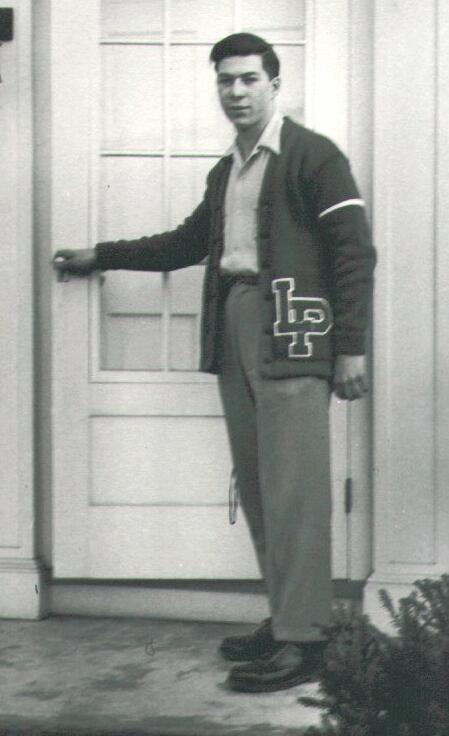
As High School Student wearing Sports Letter gained in Football
High school graduation was a non-event. I gave the Valedictorian address, a slightly different version then some people expected. This was during the Korean War, and I was quite involved in pacifist thinking. I hitchhiked to Chicago along with Armond Snowden for a Fellowship of Reconciliation meeting and met Bayard Rustin, later of civil rights fame. During that trip we had dinner with Miriam, later my Dad's second wife and formerly mom's roommate in college.
Photos from my 60th High School Class Reunion
My major hitchhiking adventure was on my own to Annual Conference in San Jose, CA. Mother packed sandwiches which got me west of the Mississippi. I came home with about as much money as I had when I left since I was a caddie for a golf tournament in CA to make a little money, a skill I learned at the Colonial Park Country Club. The trip was endurance rather than varied, the one exception was the day rest I took in Denver on a Sunday. I went to the Unitarian church, was invited for a day long picnic on Flagstaff Mountain above Boulder, CO and met the whole Socialist Party of the state of Colorado. Not bad for a rest day. The result was to give me a confidence of not being confined. I now knew that if I wanted to get somewhere, I could.

High School Graduation photo
Undecided as to career, I chose Juniata College, since it was an allowable chance to get off Dad's turf. At college night, the recruiter, suggested a chemistry major, since Juniata had done very well with that field of study. My Freshman year was a bit of a shock. I had not had to work very hard in high school, expect for English class. The college Profs. assigned massive amounts of work and expected it to be done well, and on time. Also good writing was not only stressed but insisted upon. The weekly English conference reviewed all the papers from all courses for their grammar, presentation style, spelling, etc. It appeared that English had taken over my whole life just when I had to learn to work faster.
By the middle of my second year I finally felt that I was getting ahead. Chemistry turned out to be a good choice. We had a good class with a keen competitive spirit, hence were given more work and accomplished much more. As my minor I chose a Professor, Wayne Glick, because I found everything he taught to be very interesting. By default the area of study for my minor was religion and philosophy.
Summer employment during college was unplanned at best. The most interesting was my summer as an Intern in Industry sponsored by the Friends Service Committee (Quakers). As part of this program about twenty of us lived in south Philadelphia, in a former German seaman's home, found our own jobs and participated in discussions and special activities. I tried the usual thing of registering with job service, chasing newspaper leads, until one day I gave up and just started pounding on doors. Within two hours I found a job as the forth man on a four man lithograph press. I learned about paper and printing inks, especially about cleanup solvents.
My roommate was Alphonso Smith (Billy), a black from Baltimore. I learned much from him, trying to understand the roots of my work ethic. Visited Haverford, Swarthmore and Pendel Hill, meeting many "pinks" and liberals who were then being pushed since we were in the middle of the McCarthy era. As my means of defiance I subscribed to the Daily Worker and the National Guardian, and had it delivered daily to my college mailbox. Because of this I thought I may have gained a FBI listing, but in later years when I got a Top Secret government security clearance, it was clear that my record had stayed clean.
Another summer, I got a job in the chem lab of the steel mill. Several days before I was to report to work, Harry Truman nationalized the steel mills and the workers went on strike. After reading books for awhile, I got a labor job in the shipping department of a steel boiler fabricator. It was an interesting experience to see the workings of a heavy metal shop and to participate in a corrupt local of the Steelworker's union.
My last year at Juniata was very rewarding. I managed to get to New York (Opera and plays) and Washington (politics) for long weekends. I had a course that year, Advanced Physical Chemistry, where I was the only student. The book was excellent, but Dr. Davis and I had to both fight to stay awake in class.
After Graduation from Juniata I spent the summer living in Lancaster with Grandma Royer on East Ross Street. I found a job in a malleable casting shop. Although my job was sorting castings, I observed the mold makers, and the metal pouring process. My last task at the end of the shift was to change the mold weights, while the mold maker poured the hot molten metal. I came out ringing wet with sweat. Meanwhile across town Elma worked in an air conditioned room at RCA, and made more pay than I did in my foundry job. The importance of a Father who knew someone in management became very clear.

College Graduation photo
I felt really "on my own" the fall day when father put me on the train in Harrisburg to go to Yale. The taxi took me from the station in New Haven to the Gothic stone "Hall of Graduate Studies" which was to be my home for the first year at Yale. I had a two room suite with a stone fireplace, but shared it with Johannes Wilbert, a German Anthropology student. The first year in the Chemistry Department was heavy with course work, but I did very well. Math for chemists, was the toughest. Four lectures, then an exam, repeated each week for the first semester to cover all aspects of higher math we were to master. Hard, but well taught. Each month we had an exam on an unannounced chemistry subject. Since I was well prepared from my Juniata experience, I was able to pass 5 of these the first year. Since this was 5 out of the 8 I needed for the PhD, I was marked as an excellent student and had no problems the next two years until graduation with the PhD.
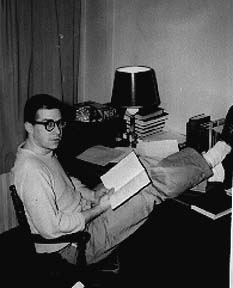
As student at Yale Graduate School
My professor asked me what I was intending to do during my first year's Christmas vacation. I told him I was planning to be married. His first impression was to give me a talking to, but quickly came to the conclusion that it was too late. Had a Christmas Eve wedding, with father as the minister, and then went to midnight services at the Episcopal cathedral in Harrisburg.
Elma got a job in New Haven, as an itinerant music teacher, and we moved into a third floor railroad flat, and lived on a weekly budget less than my first year's weekly expenses.

One summer the lab was closed for plumbing replacement, so we took the opportunity to cross the U.S. in Elma's Ford. We camped most of the way and saw many of the sights I had seen earlier as a ten year old. Major event was a climb of Long's peak in the Rockies. The effects of the sun exposure had us crippled for almost a week.
After graduation and an extra summer when I repeated my thesis work on another compound, we left on the Bremen for a 10 day sail from New York to Bremerhaven. Our Fulbright year started on the Rhine in cold wet September. On arriving in Göttingen we were housed with a German family, the Ruprecht's, for one month as part of an Experiment in International Living indoctrination program. We attended classes to learn better German and about Germany.
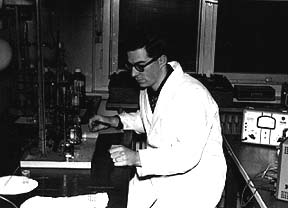
In lab at the Max Planck Institut
My work at the Max Planck Institute for physical chemistry, was with Prof. Bonhoeffer. He has just come home from Moscow disputing the theory of the electrochemical double layer with Prof. Frumkin, so my problem was picked to do some confirming lab work. I had a lot to learn about electrochemistry. The learning went fast, but the lab work slow. For my second year I applied for and was awarded a National Science Foundation Postdoctoral Fellowship. The stipend helped fund my extensive travels.
Before going home I had a chance to visit 24 different countries, including a car trip to Greece and Turkey. While in Greece we took deck passage to Egypt and went on tour with the German Student group. The tour was fantastic even though in the German language. We met a few friends in Egypt who later visited with us in the U.S. We came home through Spain and Portugal and on to the new location in Chapel Hill, N.C.

Visiting Egyptian Official, with my son Tom, Chapel Hill, North Carolina
While I was doing studies on the in ground disposal of radioactive waste water, Elma became a full time graduate student in musicology. Tom was conveniently born between the summer and the fall semesters.
One of my fellow chemists was a postdoc from England. I was telling this chap the virtues of seeing the country by hitchhiking and he challenged me to go along. So to present my first paper at the Clay Mineral Conference in Norman, OK, we hitchhiked across the country, toured Yellowstone, California and the big event, walked to the bottom of grand canyon and stayed overnight at Phantom Ranch. After the paper, I flew home.
I was a Scoutmaster of the troop sponsored by the Episcopal church. As such I was one of the ones selected to take a group to the National Jamboree in 1960. Our bus tour included Philmont Scout Ranch and the jamboree campout in Colorado Springs.
Link to Scouting page.
Sue was born in Chapel Hill and Jane on a snowy night after we moved to Boston. My work at A.D. Little, Inc. exposed me to many industrial executives and taught me how to conduct applied contract research. During that time we were able to take a vacation in Mexico and the Caribbean, and later I got to Poland and the Soviet Union as part of a business trip to Europe.
In 1964 on a balmy April day in Washington with the tree blossoms out I was interviewed for a laboratory administrator job in the Dept. of the Army at Ft. Belvoir. It was a chance to work with a group instead of as an individual consultant and had a very substantial ( 2 million) annual budget. Since it was still cold and dreary in Boston, I made the decision and started looking for a house near Mt. Vernon.
I didn't realize how big a challenge it would be to learn to administer in Civil Service. It was, however, very good training for later, since one had to deal with and solve people problems, not avoid them by firings. I also enjoyed working with the commercial vendors to the government, to encourage them in scientific progress through the placing of research contracts. I became expert in electrochemical power sources.

After three years, and the birth of Glenn, I got a chance to transfer to Ft. Monmouth, N.J., to head a group of about 100 people with an annual budget of 5-6 million. It was a busy, interesting and powerful position. The frustration was the inability to take commercial development of new technology the entire way to the market place. In the fall of 1969, I became Director of Research of ESB Inc., the largest battery company in the world. I quickly transformed an old style commercial laboratory into a highly productive new product oriented development activity. One product which I got started later became the basis for a successful new company making several of my associates millionaires. The success of the laboratory and the aggressive management style in fact lead to opposition within the company leading to my being "fired" two weeks after my fortieth birthday, hence accelerating my mid life crisis.

My fortieth birthday party was in a camp ground in Canada on a family vacation. We flew to Seattle with camping gear, and toured Washington, British Columbia, Alberta and Montana. Three tents, one for boys, one for girls and one for parents, housed the family. Glenn was old enough to keep up and Tom still interested in the family. This was still the case two years later when the whole family flew to Budapest, Hungary and to Vienna for a spring break vacation.
During the nine months of unplanned unemployment, I took several short term jobs, including selling real estate. I kept the money coming in but without any sense of direction. My next job as Director of Research Administration for Pfizer Central Research in Groton, CT was a desk job associated with various functions of running a research facility and planning for required support services. The only part of the job that I found stimulating was the planning for and the project management of the construction of several new research facilities. I had to preside over the redo of the building energy control system in the midst of the energy crisis.
One of the more interesting side activities during this period was my work with Father Hume on the vestry of St. John's Episcopal church. I became a good friend to and an advisor on many questions facing the parish. I was however, entering a deeply troubled mid life crisis. I felt so many responsibilities, yet so little ability to work out vital concerns. At times I had troubles coping with Elma and the family, as well as the frustrations of a non-vital job.
During this period I met Ethel, who I later decided to live with and married when the legal opportunity existed. She was a different kind of person having many new interests and sensitivities for me as well as presenting many problems. Not wishing to continue in the "desk" job, I took some time to travel (across the U.S. by car, Europe on a railpass and to New Zealand and Australia).
I became responsible for Smoke, a female Dalmatian, at 18 months of age and trained her to become a wonderful friend and companion. Eighteen months later Ethel and I moved to Delaware where I got back into the laboratory concerning investigations of thermal energy storage associated with solar energy. I learned computer programming and enjoyed doing my own laboratory work. We finished off a new house with our own design of kitchen, baths and swimming pool. This was a very happy period, including extensive foreign travel. We saw Susan often since she was attending the University of Delaware.
Instability came when the brilliant young Director of our Institute got in trouble with the Provost. At that time Kohler Company was looking for a laboratory director for a new Operation near San Diego in California which was engaged in the same kind of research as my work at the University. We sold our house, making the only handsome profit I got from the sale of any of my residences and moved to Vista, CA. The climate was fantastic, I was able to have flowers all year round. On the lot were citrus, eucalyptus and various ground cover, but no grass. I got rid of my lawn mover and snow shovel.
Smoke was particularly happy with the pool. She would go swimming daily, especially if I was available to throw the blue ball into the water for her to retrieve. The pool, however, was tragedy for Samson. Samson was a large desert turtle who came with the house. He would come into the house once a day looking for his lettuce. He had lived next to the pool for 4 years without incident, but one day when we came home he was at the bottom drowned. I pulled him out and gave mouth to mouth resuscitation but to no avail. His lettuce had fallen into the pool and we suspect he tried to retrieve it.
Ethel, however, was having more problems with alcoholism and the constant worries with her son Eric back in Connecticut and his lack of responsibility over financial matters. This lead to a break, with Ethel packing her belongings and returning to Connecticut.
The more we advanced on the energy storage project in California it became clear that as a product it did not fit within the Kohler distribution and sales operation. During a business slowdown in 1982 it was decided to close the laboratory and reassign me to head a Research and Development laboratory at the Plumbing Division in Kohler, WI.
Moving from California where I enjoyed the beaches, the desert and the mountains and the year round outdoor climate, to Wisconsin was very painful. I didn't really have a choice since I had most of my resources tied up in the house in California, the real estate market was depressed, and the only way to recover was to let Kohler handle the sale and relocation as part of the transfer. I kept my technical sanity by buying a double envelope passive solar house, into which I installed many of the devices for energy storage which I had been researching. With computers, brought from California, and not yet needed for my work in WI, I instrumented the whole house and proved its ability to effectively reduce heating costs during the harsh Wisconsin winters.
At first I explained to my California friends that "I lived in a suburb of Milwaukee and I have not yet met any natives worth taking to". The situation improved as I learned more about the Sheboygan community and met the interesting people there.. During this period my life has become the most stable, happiest and interesting it has ever been.

Galen R Frysinger and Marlene E Roeseler
This is true in most part from meeting my friend, Marlene E. Roeseler, who is a First grade teacher in Sheboygan, and a native of Kiel, Wisconsin. You can visit her web page to see her interests. Where we were married and our final resting place.
My work with Kohler resulted in a good team of people aggressively exploiting new technology to provide improved materials and processes for making plastic plumbing parts. I personally enjoyed directing the program and my hobby of working with computers to develop means of having them help us to become more efficient and effective in our efforts.
My non-vocational hobbies have always been theater and travel. I participate in an active Milwaukee theater season of musicals, opera, plays and ballet as well as an annual theater trip to New York City.

Over the last forty years I have visited 180 independent countries. Since my retirement in 1990 I increased my travel time and visited some interesting place most every month.
I have placed many of my travel photos in a new gallery called People and Places which can be viewed on the Internet.
At this point there are less than 19 countries which I have not visited, most of which are in Africa, so my travel plans take less time, but are more strenuous and more ambitious to get to the last "Nooks and Crannies" of the world.
My personal goal is to have a good feel for how everyone in the world lives.

![]()
Return to Galen's "Life and Interests"
![]()